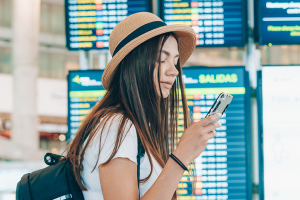When summer invites us to explore new destinations, many of us rely on public Wi-Fi networks to stay connected while traveling. Whether it’s checking email, browsing social media, or planning our next adventure, Wi-Fi access has become an essential part of our travel experiences. However, this convenience hides a threat to our cybersecurity. Public Wi-Fi networks are typically unencrypted, meaning data transmitted over them can be intercepted by hackers.
According to one study , 40% of respondents have had their information compromised while using a public Wi-Fi network. In one well-known incident, a hacker accessed a journalist’s confidential emails through an airplane’s Wi-Fi network and then approached him at baggage claim to reveal the leak. People are often unaware of these types of incidents until long after they occur.
Precauciones con el Wi-Fi público
Public Wi-Fi networks are generally unsecured and used by many different people, making them prime targets for cybercriminals looking to steal personal information, such as passwords, credit card numbers, and other sensitive data. But don’t worry! With the proper precautions, you can enjoy your travels without compromising the security of your data.
1. Know the risks: Before entering the world of public Wi-Fi networks , it’s essential to be aware of the risks involved. Public networks, such as those found in coffee shops, airports, and hotels, are typically unencrypted, which means cybercriminals can intercept data transmitted over them. This puts your sensitive information, such as passwords, credit card details, and private messages, at risk.
2. Use a virtual private network: One of the most effective ways to protect your data when connecting over public Wi-Fi is to use a virtual private network (or VPN). VPNs encrypt your internet connection, creating a secure tunnel between your device and the internet. This encryption prevents hackers from intercepting your data, ensuring your online activities remain private and secure. For added protection, before embarking on your summer adventures, invest in a trusted VPN service and install it on your devices.
3. Keep your software up-to-date: Another essential aspect of cybersecurity is to always keep your devices and software up-to-date . Updates typically include security patches that address vulnerabilities and protect against emerging threats. Before embarking on your summer travels, install available updates for your operating system, web browser, and security software. This simple step can significantly reduce your risk of falling victim to cyberattacks while connected to public Wi-Fi networks.
4. Enable multi-factor authentication: Adding an extra layer of security to your online accounts can help prevent unauthorized access, even if your passwords are compromised. Multi-factor authentication requires you to provide two or more forms of verification before accessing your accounts, such as a password, your fingerprint, or a one-time code sent to your mobile device. Enable multi-factor authentication for your email, social media, and banking accounts before you travel to enhance your cybersecurity defenses.
5. Take precautions: Avoid accessing sensitive information while connected to public Wi-Fi. Don’t log into banking or shopping accounts or access confidential work documents while connected to unsecured networks. Reserve these tasks for when you’re connected to a trusted network or when using your mobile data.
6. Practice good password hygiene: It’s crucial that when you’re connected to public Wi-Fi, you use strong, unique passwords for all your accounts. Avoid using passwords that are easily guessed or reusing the same password across multiple accounts. This increases the risk of unauthorized access to your sensitive information. Consider using a trusted password manager to securely generate and store complex passwords.
7. Consider using a personal hotspot: Using a personal hotspot , rather than public Wi-Fi networks, is often a safer option. Many mobile devices allow you to create a secure Wi-Fi network using your mobile data connection. Check your phone provider’s data plan beforehand to make sure this option doesn’t incur additional data charges.
To safely connect to public Wi-Fi this summer, you need to be informed and prepared. Some measures, such as using a VPN , keeping your software up-to-date, and enabling multi-factor authentication, allow you to enjoy the benefits of being connected to the Internet without sacrificing your personal information against cyberthreats.
To strengthen the protection of your digital devices, explore McAfee’s range of software solutions and discover the one that best meets your security needs. With the right cybersecurity tools, it’s easy to browse the internet safely while exploring new destinations during your summer adventures.













